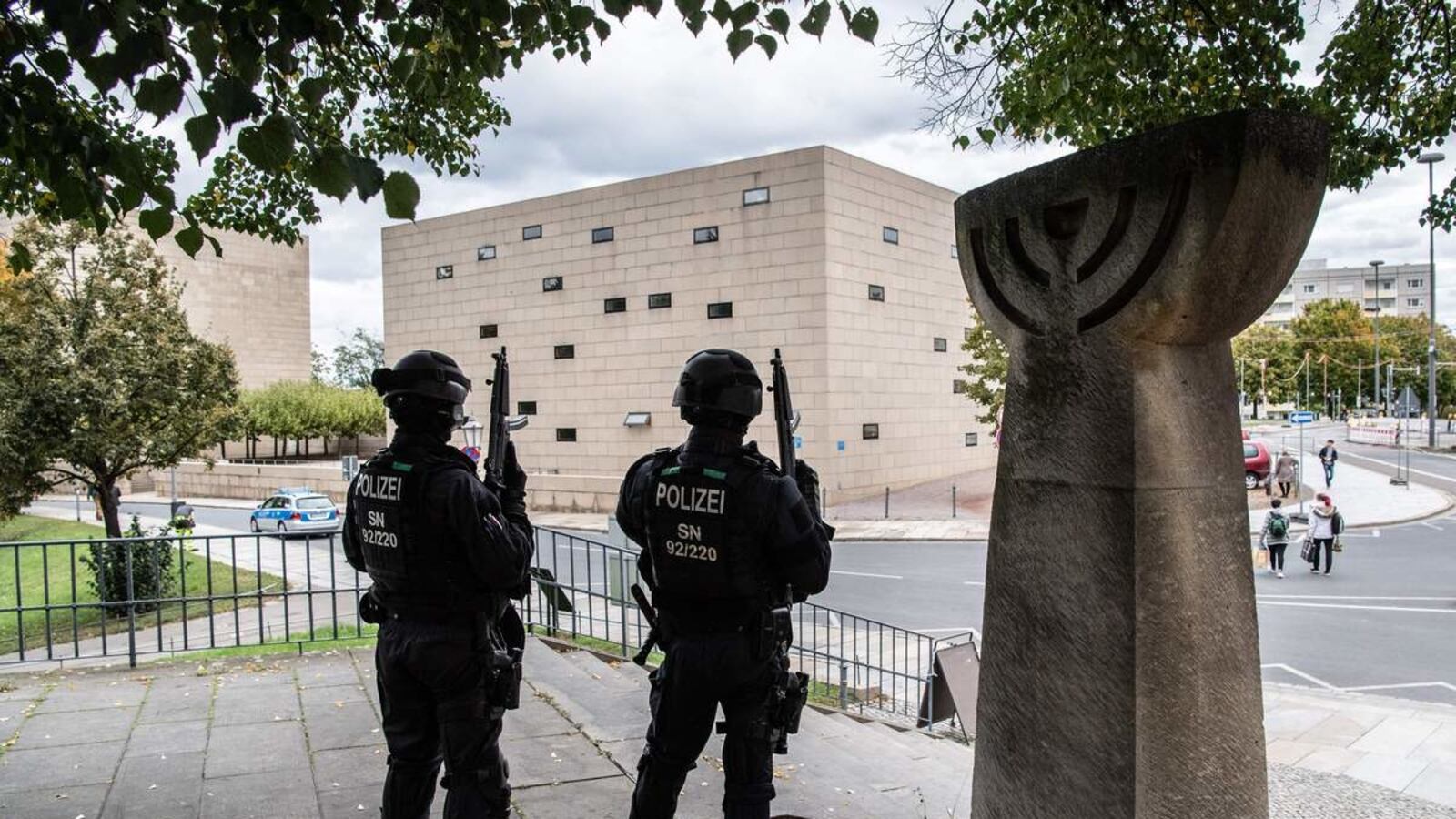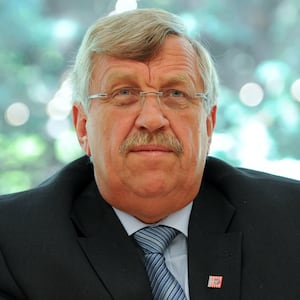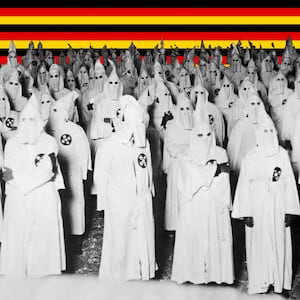BERLIN—A suspect in a rampage that left a woman dead outside a Jewish cemetery and a man murdered inside a kebab shop, on the holiest day in Judaism, livestreamed an anti-Semitic rant and the attack.
The assault in the eastern city of Halle—which included an attempt to break into a synagogue that Americans were visiting—is the latest in a series of livestreamed shootings at Jewish and Muslim places of worship.
The shooter, who broadcast live on the platform Twitch, said he was a Holocaust denier and also spouted anti-feminist and anti-immigrant talking points before the violence. Although the video was quickly removed, it was re-uploaded in various white supremacist Telegram channels.
Twitch condemned the use of its platform for the sickening footage.
“We are shocked and saddened by the tragedy that took place in Germany today, and our deepest condolences go out to all those affected,” the company said in a statement. “Twitch has a zero-tolerance policy against hateful conduct, and any act of violence is taken extremely seriously. We are working with urgency to remove this content and permanently suspend any accounts found to be posting or reposting content of this abhorrent act.”
The Twitch livestream appeared to show only one shooter. German police said they had one person in custody and were searching for a possible second suspect.
Livestreamed shootings emerged as a propaganda tool for white supremacists this year after an on-camera massacre at a mosque in Christchurch, New Zealand in March. By filming the killings, shooters attempt to publicize their acts of terror and inspire future attacks.
“The similarity between this video and New Zealand attacker’s underscores that these are not isolated attacks by people merely holding similar beliefs,” Rita Katz, director of SITE Intelligence Group, noted on Twitter. “Today’s attack is another installment from a global terrorist network, linked together via online safe havens much like ISIS.”
The shooter in the Halle video spoke mostly in English, likely in a bid to speak to the largest audience possible. (When he was muttering to himself, he spoke German.) He wore a helmet-mounted camera and military-style fatigues.
The footage shows him driving to a Halle synagogue, where more than 50 congregants, including 10 American visitors, were observing Yom Kippur. He tried to enter the building but could not get in the front gate. He appeared to attempt to open the gate with an explosive without success. While he stood outside, a woman passed him. As she walked away, he fired three shots into her back, killing her.
Max Privorotzki, the head of the Jewish community in Halle, told the Stuttgarter Zeitung that he saw from the synagogue’s outside camera “that a heavily armed perpetrator with a steel helmet and a gun tried to shoot open our doors.” The shooter could not get into the building. “We barricaded the doors from inside and waited for the police,” Privorotzki said.
The gunman later tried shooting open a different gate to the synagogue, again with no success, and threw what appeared to be explosives over a wall near the synagogue. An observer told the news agency dpa that grenades were thrown into a cemetery attached to the synagogue.
The suspect then got back into his car and apologized to viewers, apparently for his failure to break into the building. He indicated that he would “try to kill” others, drove a short distance to a kebab shop, and opened fire there, appearing to kill a man. He was then seen returning to the street and firing on a police car.
A witness, Konrad Rössler, 28, told NTV that he was standing inside the Kiez Döner kebab shop on Ludwig-Wucherer-Straße, when a man dressed in green military gear and a helmet approached with an assault rifle in his arms and “threw something like a grenade,” which hit the door frame and exploded.
“Then he shot into the store at least once... I guessed that the man behind me was killed.”
Ismet Tekim, who works at Kiez Döner, told Bild that he was just walking back to the shop during the attack. “I saw a guy, his face covered, shooting around the area wildly. Then he threw himself behind a car and shot at the police, who shot back,” he said. “Then he got into his car... it is so tragic what happened. The man (who was killed) only wanted to eat a kebab at ours.’’
Synagogues in Germany are considered high risk targets of hate crimes and often given 24/7 police protection. But according to the Jewish Forum for Democracy (JFDA), despite repeated requests to police to provide security, the synagogue in Halle was responsible for its own security on Wednesday.
The security guard who first noticed the armed gunman shooting outside the synagogue on Wednesday was working as a volunteer. Max Privorotzki, the head of the Jewish community in Halle, told the JFDA that it took a long phone call and 10 minutes before the police arrived.
“That the synagogue in Halle was not protected by the police on a holiday like Yom Kippur is scandalous” said Josef Schuster, the head of the Central Council of Jews in Germany. “This negligence has now avenged itself bitterly. It is a miracle that more harm was not caused.”
In response to the shooting, German cities like Leipzig, Dresden, Berlin, and Frankfurt—and even other cities across Europe—increased police protection in front of synagogues, schools, and cemeteries.
Christoph Heubner, the vice president of the international Auschwitz Committee, is cited in Bild saying, “that an attack against Jewish people can take place in Germany on the most important holiday in Judaism is a deep pain for survivors, which reminds them of the darkest and most murderous times of anti-semitism in Germany.”
Privorotzki has spoken in the past about an increase in anti-Semitic incidents in Halle. “Lately people aren’t hiding it,” he told a local newspaper in 2017.
Police have not released any information about the suspects or their motives. But the federal prosecutor’s office in Karlsruhe, which usually takes over terror probes, has announced that it will be taking over the case. The prosecutor’s spokeswoman told the evangelical news outlet Evangelischer Pressedienst that there are sufficient grounds for a possible right-extremist background to the murders.
In an interview with Tagesspiegel in March this year, prosecutor general Peter Frank said that the number of right-wing terror cases in which his office was currently prosecuting was “in the double digits.”
Frank warned that, “We are watching an increasing radicalization in the field of right-wing extremism. Verbally, but also in the propensity for violence.” Since then, the federal prosecutor has also taken over the case of Walter Lübcke, the local conservative politician who was shot dead outside his house this summer by a neo-Nazi whose xenophobic criminal record dates back to the '90s.
In the interview, Frank also spoke about the riots in the eastern city of Chemnitz last September, where neo-Nazis joined employees of the radical right wing party Alternative für Deutschland (AfD) to protest against foreigners and chase any foreign-looking people, while the local police did nothing.
The federal prosecutor’s office also said that it is investigating all possible motives. Heubner said in Bild, “After Chemnitz and the murder of Walter Lübcke, this attack is the next level of extreme-right terror in Germany. We now expect swift measures from a fortified state, that must in particular look at how the extreme-right scene is arming itself.”








